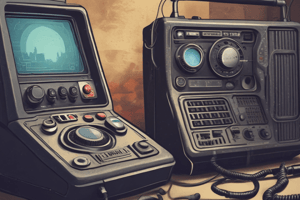Podcast
Questions and Answers
What is the main topic of discussion in this lesson plan?
What is the main topic of discussion in this lesson plan?
- Emergency response techniques
- Radio communications procedures (correct)
- Patrol management
- Jail management
What is the primary power source for portable radios?
What is the primary power source for portable radios?
- Vehicle battery
- Integrated antenna
- Electric outlet
- Battery (correct)
What is the advantage of mobile radios over portable radios?
What is the advantage of mobile radios over portable radios?
- Longer antenna
- Higher power output
- Both A and B (correct)
- Shorter antenna
What is the purpose of trunked radio systems?
What is the purpose of trunked radio systems?
What is a limitation of portable radios?
What is a limitation of portable radios?
What is an objective of this lesson plan?
What is an objective of this lesson plan?
What is the importance of trunked radio systems in the context of public safety?
What is the importance of trunked radio systems in the context of public safety?
What is a characteristic of mobile radios?
What is a characteristic of mobile radios?
What can result from holding the microphone too close to the mouth?
What can result from holding the microphone too close to the mouth?
Why is it important to adjust the positioning of microphones?
Why is it important to adjust the positioning of microphones?
What should you do before transmitting on a conventional radio?
What should you do before transmitting on a conventional radio?
What can affect your transmission on a radio?
What can affect your transmission on a radio?
What does '10-4' mean in the 10-code?
What does '10-4' mean in the 10-code?
What does '10-20' mean in the 10-code?
What does '10-20' mean in the 10-code?
What is the primary purpose of a repeater site in a conventional radio system?
What is the primary purpose of a repeater site in a conventional radio system?
What is the purpose of the 10-code?
What is the purpose of the 10-code?
What is the ABC2 rule of radio transmission that stands for 'COURTESY'?
What is the ABC2 rule of radio transmission that stands for 'COURTESY'?
What does '10-33' mean in the 10-code?
What does '10-33' mean in the 10-code?
Why is it important to THINK before you SPEAK on the radio?
Why is it important to THINK before you SPEAK on the radio?
Why is it important to minimize noise around you during emergency transmissions?
Why is it important to minimize noise around you during emergency transmissions?
What is the correct way to initiate a radio transmission within your agency?
What is the correct way to initiate a radio transmission within your agency?
What can block portable (hand-held) transmissions?
What can block portable (hand-held) transmissions?
What is the purpose of using the Phonetic Alphabet in radio transmissions?
What is the purpose of using the Phonetic Alphabet in radio transmissions?
Why is it important to use plain language in multi-agency, multijurisdictional events?
Why is it important to use plain language in multi-agency, multijurisdictional events?
What is the correct way to acknowledge a radio transmission directed to you?
What is the correct way to acknowledge a radio transmission directed to you?
What is the recommended position for holding a microphone during transmission?
What is the recommended position for holding a microphone during transmission?
What is the main disadvantage of using private codes or terminology during multijurisdictional events?
What is the main disadvantage of using private codes or terminology during multijurisdictional events?
What is the primary advantage of using a trunked radio system over a conventional system?
What is the primary advantage of using a trunked radio system over a conventional system?
Flashcards are hidden until you start studying
Study Notes
Radio Communications Procedures
- This course covers radio use and procedures, including discussion and demonstration.
Objectives
- Operate and understand functions of assigned radio equipment
- Identify the ABC2 Rules of Radio Transmission
- Discuss three methods of improving transmissions during emergencies
- Describe how to initiate and acknowledge radio transmissions
- Apply Interoperability principles and appropriate use of plain language
- Appropriately use the Phonetic Alphabet
- Identify five effective radio/microphone techniques
Radio Equipment
- Portable Radios: handheld receiver-transmitter using a battery as a power source and integrated antenna; limited range (approximately 1-mile)
- Mobile Radios: receiver-transmitter mounted inside a vehicle; powered by the vehicle battery (power system) which increases the effective range; higher antenna also increases range
- Trunked Radio Systems: allow multiple users to operate on fewer frequencies; frequencies are assigned to tower sites; importance: radio spectrum is very busy and limited
- Conventional systems: use radio-to-radio (direct) communication or a system of repeater sites; repeaters use more powerful radios and taller towers to receive and repeat transmissions
ABC2 Rules of Radio Transmission
- A: ACCURACY - get the desired information to the receiving party without errors
- B: BREVITY - avoid unnecessary or repetitious words
- C: COURTESY - respect reflected in tone of voice
- C2: CLARITY - ability to be understood; say what is expected in the proper format; speak clearly and concisely
Improving Transmissions during Emergencies
- Minimize noise around you (wind noise, screaming, etc.)
- Maintain composure and keep calm during stressful situations
- DO NOT shout (over-modulates the microphone and disrupts communications)
Initiating and Acknowledging Radio Transmissions
- When initiating traffic, state your badge number and then the identifier of the person you are trying to contact
- Always provide your location when initiating contact or when called or when going out on a stop or incident
- Acknowledge radio transmissions directed to you by saying "understood", using the appropriate 10-code, or identifying yourself by badge number
Interoperability and Plain Language
- Use plain language for multi-agency, multijurisdictional, and multi-discipline events to improve interoperability
- Avoid using private codes or terminology during these events
- Be aware that language or terms used may be unique to one jurisdiction or discipline and may not be common to others outside of that group
Phonetic Alphabet
- Used to improve clarity and understanding over the radio
- Law Enforcement in Missouri generally uses the Police (LAPD) Phonetic alphabet (A-Adam, B-Boy, C-Charles, etc.)
- Some agencies may use the International (military) alphabet (Alpha, Bravo, Charlie, etc.)
Effective Radio/Microphone Techniques
- Microphones are sensitive; position the microphone at a 45-degree angle to avoid picking up breath sounds and hold the microphone one inch from your lips
- LISTEN to make sure nobody else is talking; LISTEN for dispatch to sign off
- THINK before you SPEAK; collect your thoughts before calling to avoid dead air or verbal signs
- Conventional radio repeater systems have a slight delay in keying; wait a few seconds to allow the electronics to catch up
- The location of your radio antenna will affect your transmission; avoid blocking yourself by parking too near buildings, under power lines or overpasses
Studying That Suits You
Use AI to generate personalized quizzes and flashcards to suit your learning preferences.



